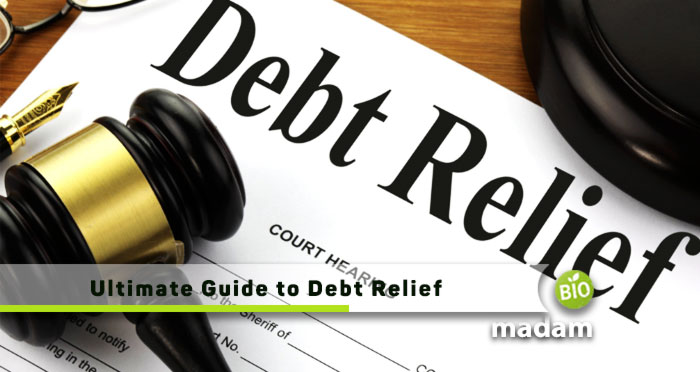Are you feeling overwhelmed by your debt? Are you struggling to make ends meet and don’t know where to turn for help? You’re not alone. Many people find themselves in the same situation. But there is a way out and it’s called debt relief. This blog post will explain all the basics of debt relief and provide some tips on how to get started.
Go Through the Proper Channels
It’s important to go through the proper channels when trying to get debt relief. The experts working at Pacific Debt Relief know how important it is to find the right way to handle this financial matter. This means talking to people or organizations who can help you deal with your debt, like a financial advisor, a bank, or even a nonprofit organization.

Going through the right channels will let you know all of your options and make sure that you’re getting advice from people who understand the best ways to deal with debt. It can also help you find ways to pay off your debts in manageable amounts over time and avoid making mistakes that could cost more money in the long run.
Consult an Advisor
An advisor is someone who knows a lot about money and can give advice about how to pay off debt. They can also help you make a plan that makes sense for your situation, so you don’t have to guess what to do.
Expert advisors will also look at all the options available so you know what will work best for your budget. They may be able to suggest strategies or programs that could lower your payments or even reduce the amount of debt you owe. They’ll also make sure that any steps taken are safe and legal, so there won’t be any surprises down the road.
For example, an advisor can look at your credit report and suggest ways to improve it. This might include paying down certain debts or disputing inaccurate items. They’ll also be able to help you figure out how much you can afford to pay each month and prioritize which accounts should be paid off first.
Create a Detailed Budget
A budget is like a plan for how you will use your money and helps you decide what to do with it. You will write down how much money comes in each month and what you want to spend it on, like rent, food, and clothes. When you make the budget, make sure that all of your bills are covered first before spending money on other things. Having a budget also helps you pay off your debts because it shows where all of your money is going so that more can be spent on paying off debts instead of buying things that are not necessary.
Another way creating a detailed budget can help with debt relief is by tracking all of your expenses and income so that nothing gets missed or forgotten about when making payments toward debt. This makes sure that everything gets paid on time so there are no late fees or penalties added onto the amount already owed, which can cause the amount to become even bigger if not paid in time.
Reduce Expenses
There are various monthly expenses that you need to handle regularly. These are the following:
- rent or mortgage
- utilities
- groceries
- transportation
- Internet and phone
- health and wellness
- entertainment
- personal care
- clothing
- home maintenance
- saving and investments
Make sure to look into where you can cut down on expenses. For example, you can look into canceling subscriptions, eating out less frequently, and using public transportation instead of driving if possible. Taking a close look at your budget to figure out where you can reduce expenses is an essential step toward debt relief.
Increase Your Income
When you have more money coming in, you can easily pay off existing debts as well as prevent new ones from forming. With an increased income, it will be easier to save for emergencies and unexpected expenses which can help avoid racking up additional debt. Additionally, having a higher income will make it possible for you to negotiate lower interest rates on loans or credit cards and pay off the balance faster.
This could potentially save hundreds or even thousands of dollars in interest over time. For example, if you have a loan with a high-interest rate that is due in five years and you can negotiate it down to 2%, your total cost of the loan would go down significantly. Furthermore, increasing your income gives you more flexibility to make choices about how you want to allocate funds.
Develop a Repayment Strategy
A proper repayment strategy will tell you what to do each month so that your payments are affordable and on time. When you have this figured out, it will be easier to pay off all of your debts in a reasonable amount of time. This way, you can get out of debt and get back on track with your finances!
Another way developing a repayment strategy can help with debt relief is by helping people prioritize their debts. When someone knows how much they need to pay each month towards their debt, it helps them decide which bills should be paid first and which ones can wait until later.
Negotiate with Creditors
This means talking to the people you owe money to and asking them for help. You can try negotiating for lower payments, longer payment plans, or even reduced interest rates. This could help you pay off your debt faster and save you money in the long run.
Another way creditors may be able to help is by writing off some of your debt if you don’t have enough money to pay it back in full. This means that the creditor will agree not to ask for any more payment than what they are already owed. They may also stop charging late fees and other charges related to your account so that it doesn’t continue growing over time as interest accumulates. Negotiating with creditors can be a great way of getting out of overwhelming debt!

Debt relief is possible with the right strategies. Consider consulting an expert advisor to review your credit report and suggest ways to improve it, create a detailed budget that prioritizes paying off debt over other expenses, reduce monthly costs where you can, increase income for more flexibility in payments, develop a repayment strategy to prioritize which debts should be paid first and negotiate with creditors when needed. With these steps taken, you have the potential to get out of overwhelming debt!

Hi, they call me Jenna, and I am also known for achieving a gold medal during my Ph.D. in science life. I always had a dream to educate people through my utmost writing hobby. So, I chose this blogging path, and Biomadam gave me this opportunity to present for them. I now stand to entertain you. Continue reading my articles & discuss if you’ve any confusion through the comment section below.

